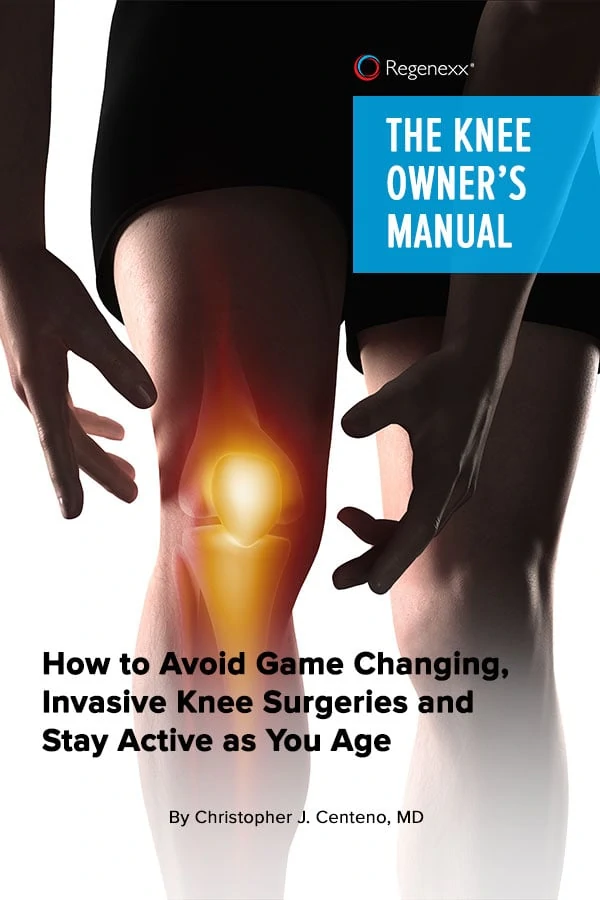Why are middle age people getting knee replacements? One possible reason is that the commercials make the activities following a knee replacement look exciting and fun, especially for good-looking, younger-appearing (and with each new commercial, they seem to get younger and younger) middle-age people. These device manufacturers know how to target consumers for their product, and they know how to connect with the viewers’ emotions to draw them to what they are selling. Show a middle-age person playing Frisbee on the beach with their dog after a supposed knee replacement, and, suddenly, the middle-age viewer with knee arthritis, who’s probably never in their life played Frisbee on the beach with their dog is considering the highly invasive surgery with the hopes of doing just that or something similarly active (e.g., backpacking, mountain biking, etc.).
The problem is, now the device manufacturers are targeting younger and younger patients in their advertising, and the truth is, almost none of those who follow through with the surgery will ever actually return to the activity levels they expect, and for those who do, research is showing that younger people, who are naturally more active than older people, will experience many more problems with their knee replacement than their older counterparts.
The Problems with Knee Replacements
So why live with arthritis for another decade or two when you can just go ahead and get that painful knee replaced with a brand-spanking-new one now and get back to all those activities you love…and all it takes is removing that old painful knee and putting in a fresh new artificial one? For starters, if it sounds too good to be true…well, you know the rest.
The challenge with reviewing the problems with knee replacements is that the list is extensive and growing all the time, but we’ll tackle a few here. Before we review the research on younger and middle age patients getting knee replacements, let’s take a look at the well-studied outcomes of knee replacement in general.
First, we’ve seen that the return to those youthful activities after knee replacement, as shown in the ads, truly is wishful thinking. In fact, one study found that no more than 5% of patients who’d received a knee replacement realized anything even close to their normal activity levels. In addition, ongoing chronic pain is the most common problem following a knee replacement. Do you know the biggest reason knee arthritis patients give for undergoing a knee replacement in the first place? Knee pain! Yet they’re coming out on the other side of the surgery with continuing chronic knee pain.
Another study suggested that a staggering 34% of knee replacements are not medically appropriate. Why? Because your knee pain may really be due to an issue in your low back (replacing the knee certainly won’t fix a problem in the low back). There’s also the well-established knee replacement risks, including strokes, heart attacks, and so on.
So would knee replacement a younger population, who would naturally be physically stronger, help negate some of these poor outcomes? No, and it’s often even worse…
Middle Age Patients Getting Knee Replacements: Trending Toward Younger and Younger Patients
Between 2000 and 2015, the average age for a knee replacement in the U.S. progressively dropped from 68 to 65.9. While on the surface, this might not seem big, you have to focus in on what is driving these averages lower and lower, which happens to be younger people (aged 60 and below) getting knee replacements. Also keep in mind that these averages are progressively trending downward; where will they be in another 15 years if we don’t address them now?
So do younger and middle age patients getting knee replacements at least have better outcomes after knee replacement? Not really. In fact, the younger a patient is when undergoing knee replacement, the more likely the new knee will fail! This is because the younger the patient, the more active he or she naturally is, so a lot more will be expected of their new knee. An older patient who is active may take a leisurely stroll around the block after dinner each night, while a younger middle-aged patient who is active may run, hike, or even play some hoops with friends after work a few nights a week after a knee replacement.
What about pain? Does a younger body at least get the benefits of more pain relief after knee replacement. Unfortunately, the research doesn’t seem to support this either as pain has actually been shown to be worse for younger patients with knee replacements than it is in the older patients, and the same can be said of middle-aged patients with meniscus tears. Even though more-severe arthritis is typical for the older patients, again, the higher activity levels in the younger patients may be contributing to more pain in this group.
Perhaps the most disturbing issue is the longevity of the artificial knee. While the older population can often get 15 years from their prosthetic before a revision, younger patients, who often go into the surgery expecting the same 15 years, are actually having to undergo revisions much sooner. One study found that 15% of younger patients who undergo knee replacement will have early failure of the knee and will have to undergo a revision within five years!
So is middle age patients getting knee replacements a good idea? To answer that you need to consider that if you’re active, you’ll be hard-pressed to make it to 55 or 60 without a second knee replacement and 65 or 70 for the third one (assuming there is enough bone left to perform a third knee replacement). What happens when you’re 75 or younger, and your final knee replacement has failed? This isn’t one of those issues where you just say, “I’ll worry about it when I get there.” Making the right decisions about knee replacement now, no matter how old you are, to assure that you don’t have to worry about it later is the key.
Here’s the upshot: you can, if proactive enough, avoid knee replacement surgery undergoing our Percutaneous Knee Arthroplasty, or PKA, for short.

